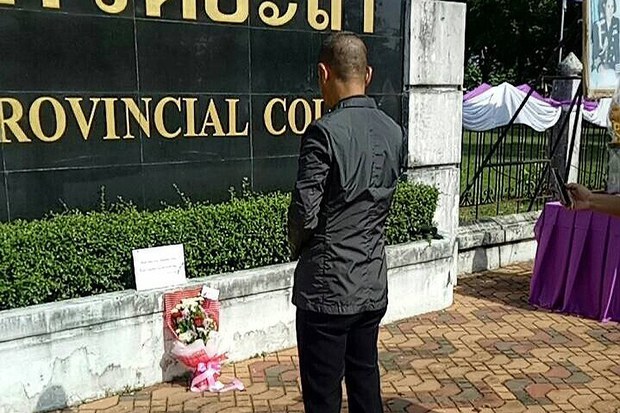Thai Judge Who Accused Superiors of Meddling in Verdicts Commits Suicide
2020.03.07
Pattani, Thailand
 A man pauses to reflect after laying a bouquet in front of Yala Provincial Court in southern Thailand, in a show of support for a judge who survived after shooting himself in his courtroom, Oct. 5, 2019.
A man pauses to reflect after laying a bouquet in front of Yala Provincial Court in southern Thailand, in a show of support for a judge who survived after shooting himself in his courtroom, Oct. 5, 2019.
A judge who shot himself in a courtroom in Thailand’s troubled Deep South last year, when he alleged that superiors had pressured him into convicting murder suspects, died Saturday of a self-inflicted gunshot wound in a separate shooting, police said.
Judge Kanakorn Pianchana died at a hospital in northern Chiang Mai province after being shot and wounded at a home in Doi Saked district, a local police official told BenarNews.
“I was informed by the McCormick Hospital in Chiang Mai that a judge shot himself and he expired at the hospital. We discovered he was Kanakorn Pianchana, former chief judge of the Yala first court who tried killing himself in a Yala provincial court,” said Lt. Col. Satitchai Nitayawan, deputy chief of the Mae Ping station in Chiang Mai.
Doctors at the hospital could not save Kanakorn, 50, according to Sarawut Benjakul, secretary-general of the Office of the Judiciary, the Bangkok Post reported. The shooting occurred on Saturday morning at Kanakorn’s home in Chiang Mai, while the senior judge’s wife and daughter were out, the newspaper said.
Kanakorn had been transferred to a court in Chiang Mai from the far southern region after judicial authorities conducted an investigation into his public suicide attempt in Yala province last October.
In a post on his Facebook page on Friday, the judge expressed fear that he could lose his job over the courtroom shooting, after which police charged him with bringing a gun into a public place without a permit.
“I was investigated by a judicial committee and the police charged me in a criminal case, in which I believe I will certainly be fired,” Kanakorn said in the post dated March 6.
“I affirm to friends and fellow Thais that what I’ve done is to provide people with justice … I’m proud to be a part of attempts to serve people with justice,” he wrote in Thai.
On Oct. 4, 2019, Kanakorn startled an audience in his Yala courtroom when he took out a handgun, aimed it at his chest and pulled the trigger, in scenes that were broadcast live via social media. He shot himself moments after acquitting five defendants charged with killing five people at a poultry farm in the province.
Before entering the courtroom that day, Kanakorn posted another message on his Facebook page, in which he complained that higher-ranking officials in the Thai court system were pressing him to convict the suspects. In that post, he said he planned to disseminate his verdict in the case via Facebook Live.
“I [will do a] live broadcast to tell people that the director of the office of the chief justice (for Region 9) ordered me to penalize the five defendants without solid evidence to prove that they committed crimes, but I don’t follow him,” Kanakorn wrote on Oct. 4.
The images from the shocking courtroom scene went viral on social media in Thailand.
Commentators said the incident shone a spotlight on the lack of independence in the Thai judiciary, particularly in the heavily militarized southern border region, where a separatist insurgency has simmered for decades.
Prior to turning a gun on himself inside the courtroom, Kanakorn had also complained on Facebook about constant political interference from his superiors to convict suspects, particularly suspected insurgents, and that he was under pressure, too, to acquit security forces charged with abuse.
After that incident in October, a spokesman for the regional security command denied that the military had ever interfered with local courts.
In the wake of Kanakorn’s public suicide attempt, Thai court authorities said they were launching an internal investigation into his conduct. While Kanakorn was recovering from his gunshot wound at a Yala hospital, court officials denied reporters access to the judge.
“I offer my deepest sorrow for the death of Judge Kanakorn Pianchana. My condolences to his wife and child,” Angkhana Neelapaijit, a former member of the National Human Rights Commission, told BenarNews on Saturday night.
“He recognized problems in the judicial system, such as the invocation of special laws [in the Deep South] for 15 years. The military has roles in the judiciary, arrests, and investigations, but there have been many reports of human rights violations in Deep South,” she added.







